- Home
- Susanna Kearsley
The Rose Garden Page 7
The Rose Garden Read online
Page 7
I’d been sure there were fairies concealed in the soft nodding bluebells that peered from the grass of the verge, and I’d trodden with care so as not to disturb them. Each stir of the breeze through the leaves had, to my childish ears, seemed to carry a faint lilting music, not meant for the grown-ups, that beckoned me on. I had often imagined the tunnel of trees was the doorway to fairyland, and I’d been certain that one day I’d step out the other side into some wonderful place.
It hadn’t happened to me then. It didn’t happen now. But still, I felt a thrilling echo of that old anticipation as I passed out of the trees and started down into Polgelly. Here, I thought, was all the magic one could need.
I felt like a child in the summer again at the first sight of the whitewashed shops and houses on the twisting streets, the rooftops stacked like toy blocks up the hills around the harbour where the gulls, drawn by the smells of fish and seaweed, circled with their plaintive cries.
The tide was out. Along the closer edges of the harbour all the smaller boats lay drunkenly tipped over on their hulls in the wet mud, still at their moorings while they waited for the sea’s return.
The harbour was a classic smuggler’s haven, curving like a finger inland, shielded at its entrance by the jagged rocks along the coast. If there had been no houses here to mark the spot it would have been impossible to know there was a harbour in behind those rocks, and even as it stood it took a bit of skill and luck for any tourist who tried navigating in by sailboat.
The street that ran along the harbour wall looked very much as I’d remembered it. The bank had undergone a change of name, but it still sat on the same corner, and the same strong scents of polished floors and paperwork were there to greet me as I entered. The new accounts manager, Mr Rowe, was a patient and thorough man who walked me through all the forms that I had to fill out. I had kept my British passport and was still a British citizen, which made things somewhat simpler.
‘And you’re living at Trelowarth, now, you said?’
‘That’s right.’
‘I’ll use that as your local address, then. And how much money would you like me to arrange to have wired over from your bank in California?’
I said, ‘All of it,’ and handed him the printed details of my two American accounts. He raised his eyebrows at the sum, but didn’t comment. All he said was, ‘Very good, I’ll have this all approved and let you know when we receive your money.’
‘Thank you.’ With a handshake, I went out again, crossing the road to the fudge shop.
The little bell still rang as I went in, and as I crossed the threshold I felt ten years old again, transported by the sweet assault of wondrous smells too rich and varied to be numbered or identified. I bought half a pound of my old favourite flavour, mint chocolate, and took it out with me, intending to indulge in more nostalgia and enjoy it while I sat among the tourists on the sun-warmed harbour wall, but my eye was caught instead by the green chemist’s sign a little further up the winding street. Felicity had said her own shop was beside the chemist’s, so I tucked the rattly paper bag of fudge into my pocket and went up to have a look.
I’d expected to find it closed, since Wednesdays were Felicity’s days off and she was still up helping Susan at the greenhouse, but an ‘Open’ sign was hanging in the front door like an invitation, so I ventured in.
The shop had a lovely, eclectic appeal, like its owner. There were notecards in delicate pen and ink, scenes of the harbour, and wind chimes of spun glass that caught the sun, sparkling. A rainbow of silk scarves and bright Celtic jewellery in silver and gold fought for space with a jumbled display of framed paintings, a few of which were Claire’s – I knew the strong sweep of her brushstrokes and the boldness of her palette and the way she brought her scenes alive with light.
Felicity’s sculptures were here as well, castings in bronze that showed all of the skill of the butterfly sundial, and more. My favourites were the little piskies, fairy folk of Cornwall – different versions of the same small figure, looking as though somebody had caught them in the middle of a dance.
Behind me, near the till, I heard a stool scrape and the sound of footsteps crossing the shop floor, and then a young man’s voice, friendly, spoke up at my side. ‘Can I help you?’
I glanced round with a shake of my head. ‘I’m just looking.’
‘See anything you like?’ The lazy smile let me know the double meaning was intentional. He would have been about my age, nice-looking, with golden-blond hair and blue eyes that seemed oddly familiar.
I looked at him more closely and his smile grew more reproachful as he said, ‘You don’t remember me.’
I wasn’t certain. ‘Oliver?’
Surely it couldn’t be Oliver, son of the woman who’d looked after Susan and Mark when their mother had died. Having come with his mother each day to Trelowarth he’d known both the house and the grounds just as well as the rest of us did. Even after Claire had married Uncle George his mother had come up to help from time to time, and when we children came down to Polgelly we had often played with Oliver.
He folded his arms on his chest, looking pleased. ‘You remembered.’
‘Yes, well, you don’t forget boys who throw rocks at you.’
‘Once,’ he said. ‘I threw a pebble at you once, and anyway as I recall you picked it up and chucked it back. And you had better aim.’
I had. I’d hit him on the forehead. Knocked him over. ‘You grew up.’
‘And you.’ He smiled again. ‘Mark didn’t say that you were coming for a visit. Are you here for long?’
‘I might be,’ I said. ‘So you work with Felicity, then?’
He corrected me. ‘Only on Wednesdays. I’m closed myself, Wednesdays.’ In answer to my questioning look, he said, ‘I have my own Smugglers’ Museum.’
‘Oh? Whereabouts?’
‘Down by the harbour, between the pub and the tea room.’ Oliver grinned. ‘I weighed twelve stone when I started up the museum. I won’t tell you what I weigh now.’
He looked fit as an athlete, to me. With his head tipped to one side, he asked, ‘Do you smell chocolate?’
‘It’s my fudge.’ I took the bag out of my pocket to show him. ‘It’s energy,’ I told him. ‘For The Hill.’
‘Let’s have a piece then.’
I offered the bag and he reached in and helped himself.
‘What’s your excuse?’ I asked. ‘You live down here.’
‘True.’ The charm was deliberate. ‘But I have a feeling I’m going to be climbing The Hill fairly often myself, in the very near future.’
CHAPTER EIGHT
I cheated, in the end. I didn’t climb back to Trelowarth by the road, but went around the harbour’s edge and up the coast path, up the gentler slope that rose by stages to the level of the clifftop, keeping to the bottom of the fields below Trelowarth as it wound its way towards the Wild Wood.
At the side of the path, clumps of dark spiky gorse were in bloom with their deep-yellow flowers, the foxgloves were rampant, and thick drifts of sea pink spilt over the edge of the cliffs. I could hear the full roar of the sea here, the swirl of the spray crashing hard on the rocks far below where I walked, and the sullen retreat of the waves.
Most tourists avoided this stretch of the coast path. Only seasoned ramblers came this way, or people who wanted to visit the Beacon. Or those, like myself, who preferred the wilder, untouched ways, and didn’t mind walking too close to the edge.
Even so, when the path reached a place where it rounded a cleft in the cliffside a little too closely, a quick downward glance at the white water boiling below on the rocks made me feel slightly dizzy. And when, as I straightened, the wind rose with a sudden force that rocked me on my feet, I turned my back to it and left the path for safety’s sake, cutting up on a diagonal through the fields below the house.
I huddled in my jacket, head tucked down, and climbed determinedly. I’d nearly reached the house when it occurred to me that something wasn�
�t right.
I should have reached the lawn by now. The level hedged lawn at the front of the house where we’d always played badminton. But I hadn’t. I lifted my head to see how much further I had yet to go. And then I stopped dead in my tracks.
The lawn was gone.
And where it should have been, not fifteen feet from me, a man was standing with his back towards me, unaware. He seemed to be watching the road.
He wore a sleeveless coat of some rough brown material that flared below his waist, and the sleeves of the white shirt he wore underneath it were rolled to his elbows in working-man style. On his legs he wore tight-fitting brown trousers tucked into boots, also brown, that came up to his knees. And his hair – that was brown as well, worn long enough to be combed back and tied at his collar, the way I’d seen sailors wear their hair in period films.
He couldn’t be real, I thought. Clearly he was nothing more than another hallucination. A good one, to be sure, and very vivid, but not real.
But it was frightening to know I’d lost control of my own senses so completely. I could only stand there, frozen, not quite certain what to do. And I would always in my mind replay the moment when, incredibly, he turned. And saw me, too.
His eyes were not brown. They were of some lighter colour, clear in their intensity against his suntanned face.
Uneasy, I stepped backwards, and he raised one hand to calm me.
‘Do not fear me. I’ll not harm you.’ Something struck me as familiar in the cadence of his voice – a deep voice, rough around the edges.
But I was afraid. It made no sense for me to be, I knew, because he wasn’t real, he wasn’t there. Pure instinct made me take another backwards step, and then another.
‘Wait,’ he said, and moved as if to follow, only something very curious began to happen then. As I moved backwards and away from him, he started to dissolve and fade, becoming like a shadow I could almost see, but not.
I thought I saw him stretch his hand towards me as though trying to reach out, to stop my leaving. And then all at once he was no longer there on the hillside, and in the same heartbeat I wasn’t there, either.
Instead I was back on the coast path again, standing all by myself at the place where it rounded a cleft in the cliffside a little too closely, and watching the water boil white on the black rocks below.
Uncle George’s study, where I’d worked on the computer this past week, had been my favourite room for hiding in when we’d played hide-and-seek as children. From behind the green chair I’d been able to see all three doors – the one directly opposite that led into the corridor, and both doors that connected with the rooms to either side. The old desk had a kneehole space that had been just the size for me to crouch in, and the long and heavy drapes that hung to each side of the window were the perfect length for someone small to hide behind.
I couldn’t hide there now, but it was maybe no coincidence that I had sought my refuge here this afternoon. I’d been here an hour, having raced up through the fields in record time to find, to my relief, that there was no one in the house yet – they were all still out attending to their work. Which meant nobody was here to ask me why I was now surfing through the Internet for articles on mental illness and hallucinations.
What disturbed me wasn’t simply that I’d slipped out of reality so quickly and so easily, but that I could have done it so completely, and that my own sense of place and time had been so badly skewed that in my mind I could believe I’d climbed the hill and seen the man in brown, when actually I’d never left the coast path.
I could no longer blame the sleeping pills – even though the articles I’d read did say withdrawal from the drugs could have the same effect as taking them, I’d only taken two pills to begin with and I’d gone a week without them, so I doubted I was going through withdrawal. And in case the cause was stress, I’d tried removing any source of that as well, even going so far as to take off my wristwatch and put it away in the drawer with my mobile phone, both former trappings of my tightly scheduled life.
I’d done everything I could do, but this obviously wasn’t something I should try to diagnose myself. I’d have to find a local doctor and explain what had been happening and see if there was any way to treat it. And I had to find out how I ought to handle any episodes I might have in the meantime.
Curled in the green chair, I scrolled through the pages and carried on reading:
Sane people know they are hallucinating. Those with mental illnesses do not.
Well that, at least, was one small bit of comfort. I’d been very well aware, the whole time I’d been interacting with the strange man on the hill, that he had not been real. And yet, it had all felt so real. The strong wind and the sun’s warmth and the hardness of the ground beneath my feet …
Hallucinations can involve a multitude of senses – touch and taste and smell as well as sight and hearing – to the point where it can be all but impossible to distinguish the imagined from the real. A glass of juice, the writer said, will taste like juice, and silk will feel like silk.
I searched on for further points on ‘Seeing People’, and discovered it was common to imagine human figures when hallucinating, and to hear them speak, and just as common to be able to have conversations in which they responded exactly as real people would. The articles assured me that, so long as these imagined people didn’t try to tell me to do questionable things, like kill somebody, they were harmless.
Our studies have shown, one psychiatrist said, that while ignoring these apparitions appears to have little effect, success can sometimes be achieved by simply telling them to go away.
Moreover …
I broke off my reading as a movement caught the corner of my eye.
I glanced up, expecting Mark or Susan, only there was no one in the doorway to the corridor. No one … and yet the doorway was not empty.
The figure of a man was passing. I could see him very faintly, like a grey transparent shadow, moving past as though he’d meant to walk right by the room. But at the doorway’s edge he stopped and leant back slightly, looking in as though he’d just seen something that he too considered out of place.
I closed my eyes and held my breath, not moving. Counted heartbeats. One. Two. Three. It isn’t real, I told myself. My brain cells were misfiring, as the articles had just explained. There wasn’t really anybody there.
And when I looked again, there wasn’t.
It gave me a thrill of accomplishment, knowing I’d managed to control it that time. Maybe that was all it took, a short pause to remind myself that I was only seeing things. At least I would be able then to muddle through until I’d had a chance to see a doctor.
On the desk a small brass carriage clock whirred briefly and began to chime the hours: Five o’clock. The others would be coming in quite soon, I thought, which meant I should stop sitting here and try to make myself a bit more useful to my hosts by going down and finding something I could cook them all for supper.
I stood and reached to switch off the computer, but before my hand made contact, the entire desk and what was on it wavered out of focus with the room, and then dissolved.
I closed my eyes again, more firmly this time, fighting back with all I had. I heard the window rattling as though from a blast of wind, and felt a brightening of light against my eyelids that surprised me into opening my eyes.
The door connecting with the spare room next to this one was now open, too, and framed within it stood the man in brown.
At least, the man who had been wearing brown, the last time I’d imagined him. This time, in place of the jacket, he wore a wine-red dressing gown that hung unfastened so that I could see he was still fully dressed beneath it in the plain white shirt and trousers and tall boots. It should have made him less imposing, but it didn’t. With the door frame for a reference he looked taller to me here. He’d have been six foot something, easily. His shoulders blocked the open space. He didn’t smile.
His voice was low and quiet
, carefully controlled. ‘What are you?’
I was thinking just how odd a question that was for my own hallucination to be asking when his right arm shifted slightly and I saw what he was holding in his hand. I saw the knife.
It was a dagger, small and neatly made, and fit his hand so well I only really saw the blade, but that was all it took to make me feel a twinge of fear. Irrational, I knew, because this man was my creation, my own mind had called him up from somewhere, and as all the articles had said, he would be harmless. But I started to retreat, to back away as I had done before when we had faced each other on the hillside, hoping it would have the same effect. It didn’t. This time, instead of disappearing, he came after me and in two strides had crossed the room to take a firm hold of my arm with his free hand.
If the contact was a shock to me it seemed to shock him more, as though he’d been expecting that his hand would pass right through me. I was much too stunned to struggle, and besides, there was no point. His grip was far too strong, and he was far too close.
He asked again, as though the answer mattered even more, ‘What are you?’
Trying to remember the advice that had been in the final article I’d read, I met his gaze with all the calmness I could muster, and replied, ‘I’m real. And you are not. Now, go away.’
The dressing gown he’d worn was made of heavy silk, with hand-stitched seams. I knew this because he had shrugged it off a moment earlier and given it to me, with the excuse that my own clothes appeared ‘ill-suited to the weather’. It did, in fact, feel cooler in the room than it had felt before, and more damp, and the dressing gown, although it was imaginary, seemed to make a difference, so I thanked him.
After all, I reasoned, if I had to sit here with my own hallucination, who was acting like a gentleman, I could at least be courteous. I knew the situation would correct itself in time, and for the moment it was nothing short of fascinating.

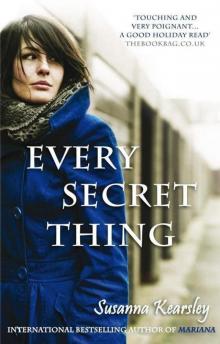 Every Secret Thing
Every Secret Thing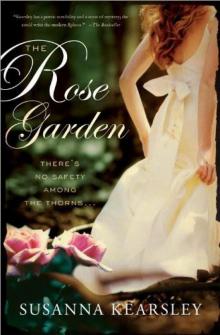 The Rose Garden
The Rose Garden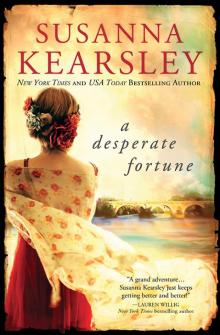 A Desperate Fortune
A Desperate Fortune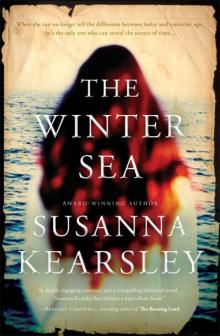 The Winter Sea
The Winter Sea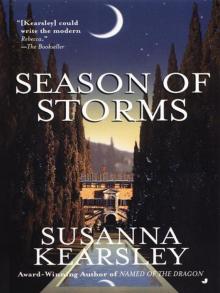 Season of Storms
Season of Storms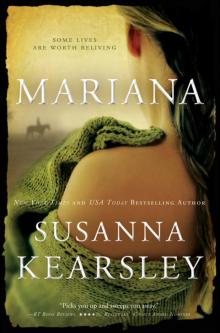 Mariana
Mariana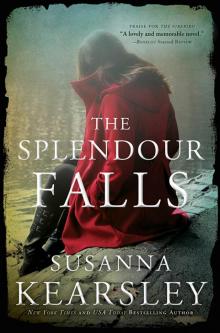 The Splendour Falls
The Splendour Falls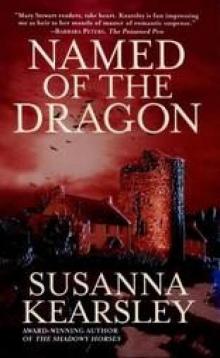 Named of the Dragon
Named of the Dragon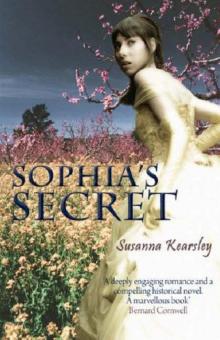 Sophia's Secret
Sophia's Secret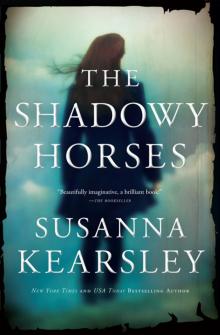 The Shadowy Horses
The Shadowy Horses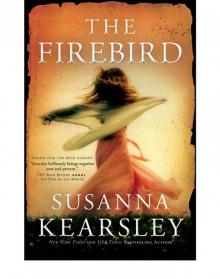 The Firebird
The Firebird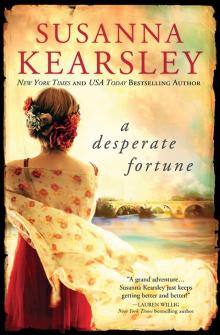 Desperate Fortune
Desperate Fortune